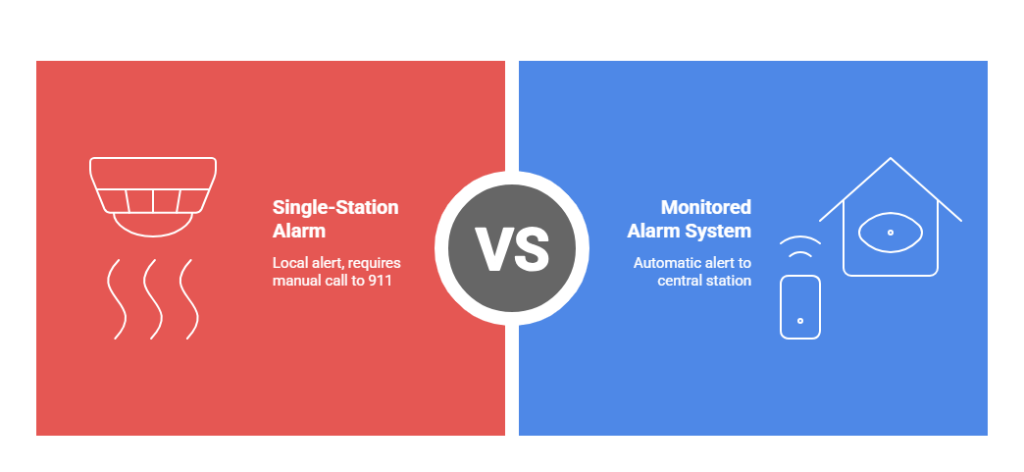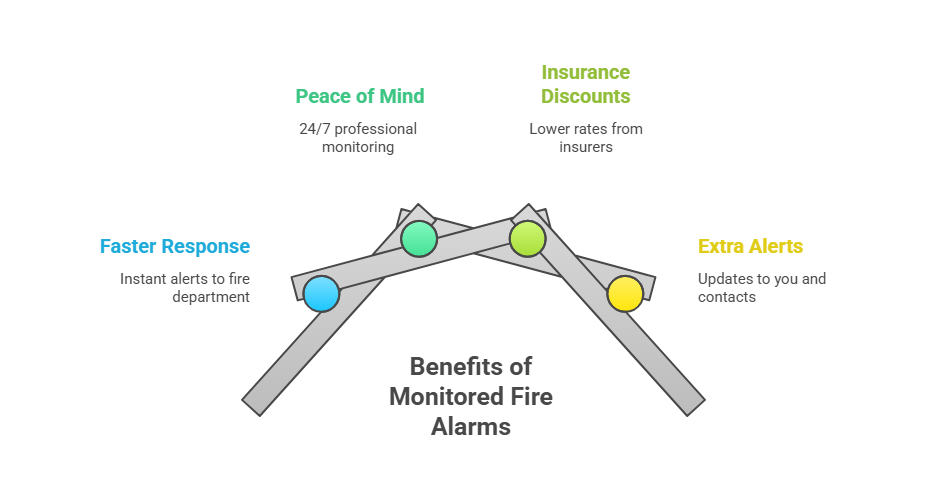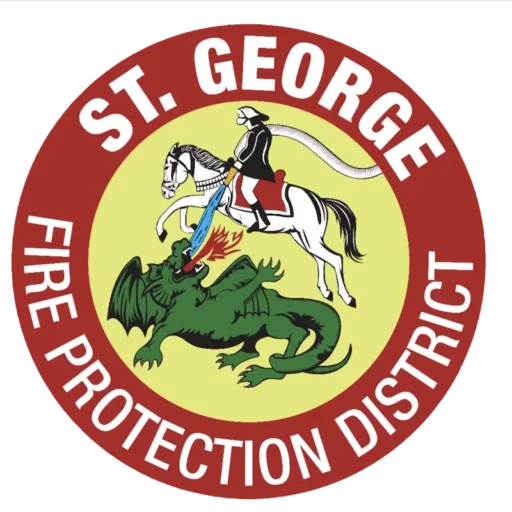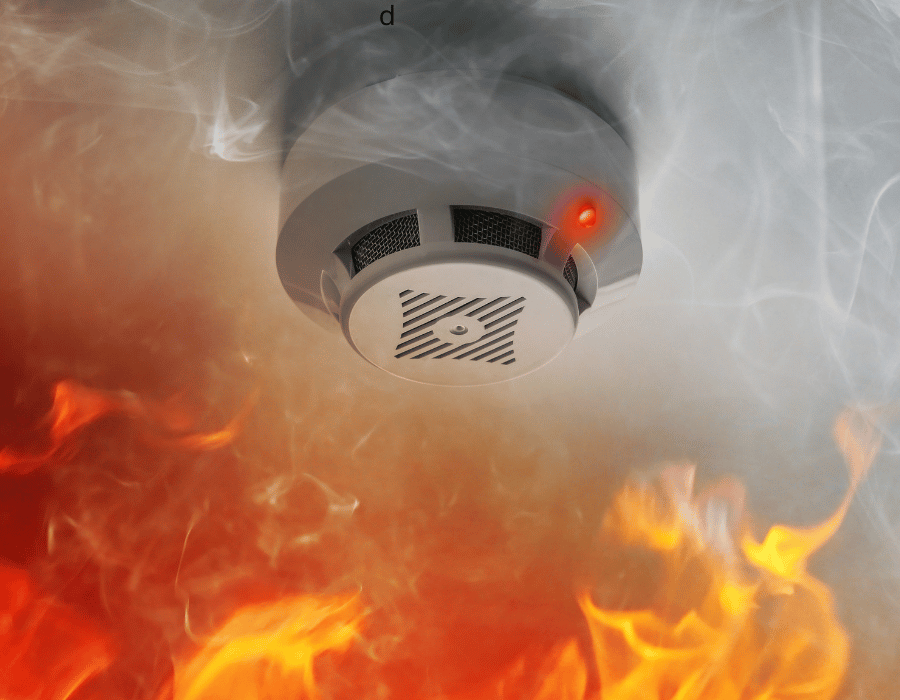Most standard smoke alarms and fire alarms do not dial 911 or contact firefighters on their own. In a typical home, when smoke is detected the alarm simply blares a loud siren inside the house to wake you up or warn people nearby. It does not have a built-in phone or wireless link to emergency services. Only special systems – usually professionally installed and monitored – can automatically alert the fire department. In fact, the default “single-station” alarm (the kind in most homes) doesn’t send any signal out at all. You’ll hear the noise, but no one outside knows it’s happening unless someone tells them.
How Home Smoke Alarms Work (and Don’t Work)
A typical battery-powered or hardwired smoke detector is like an alarm clock for fire – it screams to get your attention, but it doesn’t make a phone call. For example, most residential smoke detectors are single-station units: they trigger a local siren in the house, but they have no external alerting capability. Even if your smoke alarms are interconnected (so one detector trips them all inside your home), they still only alert people indoors. They cannot call 911 by themselves.
- Single-station alarms: Common in homes, these run on battery or home power. When they sense smoke or fire, they flash lights and sound a loud horn. But their job ends there – they do not notify anyone else. Fire safety experts point out that “smoke detectors alone don’t contact the fire department or other emergency services”.
- No automatic calling: There is no mechanism in a standalone home alarm to dial the fire department. So if your home detector starts beeping, you or someone nearby must call 911. Local fire authorities even advise evacuating first and then calling 911 immediately if an alarm goes off. In short, a solo smoke alarm is only designed to protect you and those on-site – it’s your responsibility to get help.
- Myth of “smart” calling: Even modern or smart detectors (like Nest Protect or similar) will send notifications to your phone, but they still don’t automatically dial 911. They can warn you via app or text, and may let you call emergency services through the app, but someone still needs to press send.
Monitored Alarm Systems: How They Can Call 911
Some fire alarm systems – especially in businesses or high-end home security packages – are connected to a monitoring service or central station. These systems can automatically alert the fire department when triggered. Here’s how it works:
- Professional monitoring: A monitoring company is linked to your alarm panel 24/7. When a smoke detector or sprinkler goes off, the panel sends a signal (via phone line, internet, or cellular) to that monitoring center.
- Operator response: Trained staff at the central station receive the alert. They will usually try to call you or another designated person to verify whether it’s a real emergency. If there’s no answer or the fire is confirmed, the operator will dispatch the fire department right away.
- Fast action: Because the signal goes out immediately, firefighters can be on their way in seconds – often before you even get out of the house. This can save precious time, especially if a fire starts when no one is home or everyone is asleep. In fact, monitored systems “notifies the fire department in mere seconds” once smoke is detected.
- Example scenario: Imagine a candle accidentally tips over while you’re away. A monitored smoke alarm would alert the central station, which might call you first. If they can’t reach you, they automatically call 911. Meanwhile, firefighters are already en route. Without monitoring, you’d have to hope a neighbor sees the smoke and calls it in – a much slower process.
Single-Station vs. Monitored: What’s the Difference?

Understanding the terms can help you know what you have:
- Single-station (Local) Alarm: The smoke detector makes noise on site only. It’s completely independent. Action required: If it goes off, you must call 911.
- Monitored Alarm System: The alarm is linked to a monitoring service. Action: The system sends an alert to the central station automatically. They then contact emergency services (and you).
- Most homes have the single-station type. “Most residential smoke detectors are single-station units”. Some home security companies (like ADT, Vivint, etc.) offer monitoring plans that include fire detection. If you sign up, your system becomes a monitored alarm and will notify the fire department as needed.
What to Do When Your Alarm Sounds
No matter what kind of alarm you have, safety comes first. If an alarm is beeping:
- Stay calm and get out safely. Treat every alarm as real until proven otherwise. Leave the building immediately and help others evacuate.
- Call 911 (or your local fire department) as soon as you’re safe. Even if you have a monitored system, it’s wise to call emergency services to give them any info they need. Local fire authorities emphasize: “Yes, call 911… after assuring a safe evacuation.”.
- Meet firefighters outside. Go to your planned meeting spot so everyone is accounted for. Do not re-enter until the fire department says it’s okay.
- Don’t assume someone else called. If you live alone or haven’t set up monitoring, you must be the one to report it. In the confusion of a fire, people can forget to call. A monitored system helps by doing that job automatically, but human action should not be ignored.
By taking these steps, you ensure help is coming as fast as possible.
Why Monitoring Can Be Worth It

While most fire codes don’t require home alarms to be monitored, there are big benefits to adding it:
- Faster response: Monitored alarms alert the fire department instantly, even if everyone is asleep or away.
- Peace of mind: Knowing someone is “on call” for you 24/7 means you don’t have to rely solely on luck or neighbors.
- Insurance discounts: Some insurers give lower rates if you have a monitored fire alarm.
- Extra alerts: Monitoring centers also send you and your emergency contacts updates, so you’re always informed.
If you’re unsure whether your fire alarm is monitored, you can contact the company that installed it or a security provider to find out. They can tell you if it is “single-station” only or if it’s hooked up to a central station. Most homeowners find that having even one monitored detector (like in a basement or master bedroom) provides extra safety.
Conclusion
In summary: No, regular smoke alarms won’t call the fire department for you. They alert only people in the building. Only alarms connected to a monitoring service can automatically summon help. So, if your smoke alarm goes off, get out first, then call 911 yourself to be sure help is on the way. For the best protection, consider a monitored fire alarm system – it’s like having a vigilant partner watching over your home round the clock.
Stay safe and prepared: check your smoke alarms regularly, plan your escape route, and remember that the alarm is your warning – but you must be the one to tell the firefighters if no one else is there to do it.


